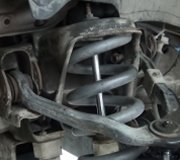Hi atul. Initially this was likely caused by one of two things. Failure to use a torque wrench on the nuts or use of grease on the studs.
Proper tightness is critical to preventing the lug nuts from loosening. All manufacturers publish torque specifications for their vehicles. There are four important reasons for this. The nuts won't come loose, studs, nuts, and wheels won't be damaged, a small person can get them loose to change a flat tire, and drums and rotors won't warp due to uneven clamping forces coupled with heating / cooling cycles.
Domestic vehicles mostly use steel studs and nuts. A LIGHT coating of grease is acceptable to prevent rust buildup in the threads, but people get into trouble when they take it to an extreme. When air tools are used to spin the nuts on, and / or too much grease is on the studs, the grease will roll up onto the rounded friction surface of the nut. That friction surface is what holds the nuts tight. Grease on the friction surfaces defeats the holding ability of the nuts.
When my students insisted on using grease on the studs, they were required to use no air tools when installing and tightening the nuts. Almost every year I had at least one student who learned from a misguided friend or relative to use anti-seize compound on the studs. That is a special grease that practicaly eliminates friction. The individual student received one verbal warning when caught using anti-seize on the studs. Upon the second offense, they were dropped from the program and the college backed up this policy because it was such a severe liability issue.
Most import vehicles use studs and nuts with an anodized coating to prevent rust. These should never have grease applied to them. A lot of vehicles today also use cast wheels instead of steel. Cast wheels are relatively soft so once the nuts come loose, the friction surfaces on the wheel become deformed and loose their ability to hold onto the nuts. This happens to steel wheels too but it is much more severe with cast wheels.
First of all, check for grease on the studs and wheels. If you find any, or if you put it there yourself, clean if off with brake parts or carburetor cleaner and a brush. Second, use a click-type torque wrench to tighten the nuts to the specified tightness. This doesn't have to be a two hundred dollar tool like the professionals use. Harbor Freight Tools and similar tool stores have perfectly fine 1/2" drive torque wrenches for under 20 bucks. Their accuracy might not be as good as the expensive ones, but consistency is what's most important. A couple of pounds of inaccuracy won't cause a problem. It's easy to understand that under-tightenend nuts will work loose. What's less known is that overtightened nuts can work loose due to deformed friction surfaces, particularly with cast wheels.
If the nuts continue to come loose, the wheels and nuts must be replaced at the same time. Don't use old deformed nuts with new wheels because the friction surfaces won't match.
One final point of interest, every manufacturer provides information in their service manuals on the proper procedures for replacing lug nut studs. If the proper procedure isn't followed, it is real likely the studs will not be fully seated. While driving the vehicle, flexing of the wheel will pull the studs in the rest of the way but that will result in loose wheels. It's a good idea to recheck the nuts with the torque wrench once or twice after driving for a few miles and again after around 50 miles. Most tires stores recommend returning a few days after having new tires installed to let them retighten the nuts. They do this for liability issues, but it shows how common it is for problems to occur.
Caradiodoc
Tuesday, February 23rd, 2010 AT 5:11 AM



